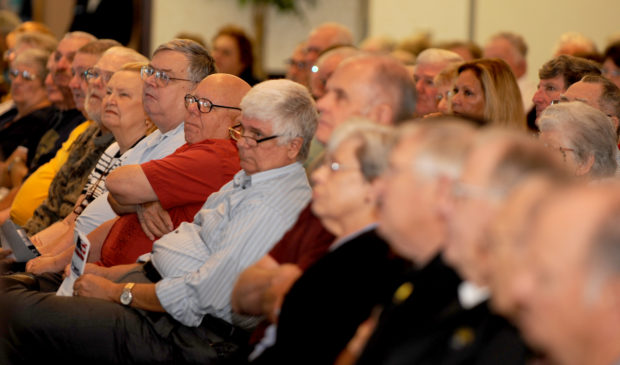Access to health care, transit among top budget priorities for Austin seniors
Friday, April 19, 2019 by
Chad Swiatecki With the city paying closer attention to the needs of its fast-growing senior population, staff and commissions involved in issues for the aging are hearing a lot of familiar concerns heading into the early stages of budget talks.
An emphasis on addressing traffic congestion and availability of transportation services, and finding ways to make housing more affordable – particularly through property tax relief – were among the top concerns shared by local seniors in recent weeks. More than 100 community members attended a forum organized by the Budget Office in late March to gather input on needs for seniors, with calls for more cultural programming, better access to health care and more frequent police patrols in neighborhoods among the common requests.
The city’s recent hiring of Tabitha Taylor as its first age-friendly program coordinator – a position that is contained in the city’s Public Health Department – marks the first time the city has had a dedicated staff member to manage and execute programs for seniors.
“We have cross-cutting things that touch on all areas for lots of people and those are things like housing, transportation and access to care that we hear about all the time, regardless of the age range that we’re serving,” Taylor said. “When we talk about housing, that really turns into talking about the social determinants of health and what we need to address to increase our well-being.”
With initial budget priorities from city departments, boards and commissions due to be turned in by the first week in May, Taylor and other stakeholders for senior issues will spend the rest of the month putting together requests based on feedback collected from the March session and other meetings throughout the year.
With City Manager Spencer Cronk and other city administrators planning for next year’s budget to be close to flat in terms of expenditures, Taylor said increasing awareness of existing city programs and searching for efficiencies is a priority.
“We’ve been advised early on to look at current programming and look at how it’s functioning to make sure we’re using city dollars appropriately based on what we’re hearing from the community,” she said. “People are now becoming aware that people are willing to listen, and we want to let them know about the programs that are already here. For some things it may be that we need to partner with another organization such as Community Care, Central Health and so forth, depending on where the recommendation relates to health.”
Janee Briesemeister, chair of the city’s Commission on Seniors, said the March session also made city leaders aware of a growing need to help seniors get access to healthy food, a problem that is compounded by transportation issues that are already a widely known concern. She also said planned changes to the city’s land development code need to keep seniors in mind, pointing to an expected reduction in parking requirements creating issues for seniors and those with disabilities.
The city’s Joint Inclusion Committee, of which the senior commission is a part, recently passed a resolution asking the city to collect detailed data on what social and demographic groups are being served by various city programs. That committee also approved a request for the city to conduct a quality-of-life study for the city’s disabled community.
“We’re taking to heart what the city manager has asked all boards and commissions to do, which is to look at ways to make what the city does more efficient and more equitable,” Briesemeister said. “With that request, we said we would like more robust data on who is getting served by programs. Our concern is age, and we’d like more granular information because there’s a big difference between a 65-year-old and an 85-year-old or a 95-year-old person. We want to know if programs are serving those different populations, and if they’re doing so in different parts of the city, because we want to see that city money is being spent efficiently and equitably.”
U.S. Air Force photo by Staff Sgt. Brian J. Valencia.
The Austin Monitor’s work is made possible by donations from the community. Though our reporting covers donors from time to time, we are careful to keep business and editorial efforts separate while maintaining transparency. A complete list of donors is available here, and our code of ethics is explained here.
You're a community leader
And we’re honored you look to us for serious, in-depth news. You know a strong community needs local and dedicated watchdog reporting. We’re here for you and that won’t change. Now will you take the powerful next step and support our nonprofit news organization?










